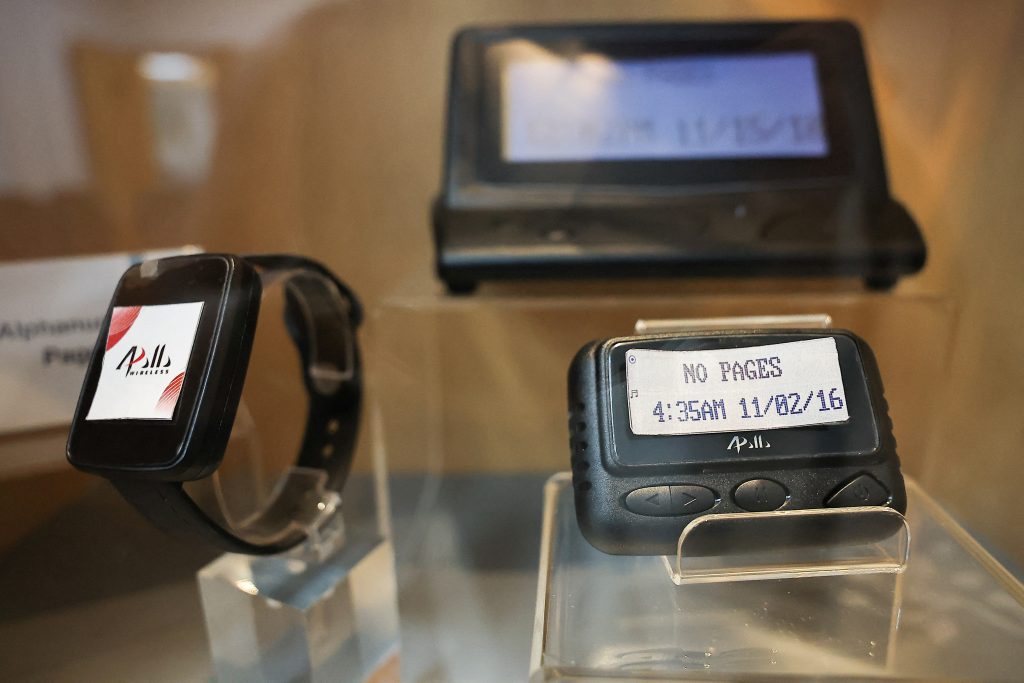BEIRUT, Sept 19 (Reuters) – Lebanon’s Hezbollah continued distributing new Gold Apollo-branded pagers to its members just hours before thousands of the devices exploded this week, according to two security sources. The group appeared confident in their safety, despite an ongoing sweep of electronic equipment to identify potential threats.
One source revealed that a Hezbollah member received a new pager on Monday, which exploded the following day while still in its packaging. Another source said a pager given to a senior member days earlier detonated, injuring a subordinate.
In what seemed to be a coordinated attack, the Gold Apollo pagers detonated on Tuesday across Hezbollah strongholds in southern Lebanon, Beirut’s suburbs, and the eastern Bekaa valley. The following day, hundreds of Hezbollah walkie-talkies also exploded. These consecutive attacks claimed 37 lives, including at least two children, and left more than 3,000 injured.
Lebanon and Hezbollah have accused Israel of being behind the attacks, with a Western security source telling Reuters that Israel’s secretive military intelligence Unit 8200 was involved in the planning. Israel, which has since increased airstrikes on Lebanon, has neither confirmed nor denied its involvement.
The walkie-talkie batteries were reportedly laced with the highly explosive compound PETN, said a Lebanese source familiar with the devices’ components. According to a Reuters report earlier this week, up to three grams of explosives had been hidden inside the pagers, undetected for months by Hezbollah. One security source noted the difficulty in detecting the explosives “with any device or scanner,” without specifying the type of scanners Hezbollah used to inspect the pagers.
Hezbollah had examined the pagers after they were imported to Lebanon, beginning in 2022, even transporting them through airports to ensure they would not trigger alarms, two additional sources told Reuters. The exact airports used for these tests were not disclosed. Rather than having specific concerns about the pagers, the checks were part of a routine “sweep” of equipment, including communications devices, to identify any potential explosives or surveillance mechanisms, one security source explained.
These attacks, along with the distribution of the pagers despite routine inspections, have damaged Hezbollah’s reputation as the most formidable force within Iran’s ‘Axis of Resistance,’ an alliance of anti-Israel militias across the Middle East.
In a televised speech on Thursday, Hezbollah Secretary-General Hassan Nasrallah described the attacks as “unprecedented in the group’s history.”
Hezbollah’s media office and the Israeli military did not immediately respond to requests for comment.
Gold Apollo, a company based in Taiwan, has denied manufacturing the devices used in the attack, stating that they were produced by a European company licensed to use its brand. Reuters has not yet determined where the devices were manufactured or at what point they were tampered with.
Earlier this year, a batch of 5,000 of these pagers was brought into Lebanon. Previously, Reuters reported that Hezbollah had turned to using pagers in an effort to avoid Israeli surveillance of their mobile phones, following the assassination of several senior commanders in targeted airstrikes over the past year.
Hezbollah’s long-standing conflict with Israel spans decades but has intensified in the past year, alongside the Gaza war, raising fears of a broader regional conflict.
After Tuesday’s pager explosions, Hezbollah grew concerned that more of its devices had been compromised, according to two security sources and an intelligence source who spoke to Reuters. In response, the group ramped up its inspection of communication systems, thoroughly examining all devices and investigating the supply chains through which the pagers had been imported, the security sources said.
However, the review was incomplete by Wednesday afternoon, when handheld radios began exploding. Hezbollah believes Israel detonated the radios because it feared Hezbollah would soon discover that these devices were also rigged with explosives, one source told Reuters.
The radio explosions resulted in 25 deaths and over 650 injuries, according to Lebanon’s health ministry. This was a significantly higher death toll compared to the previous day’s pager blasts, which killed 12 and injured nearly 3,000. The higher lethality of the radio explosions was attributed to their greater explosive payload, said both a security and intelligence source.
Hezbollah’s investigation into how and when the devices were laced with explosives is still ongoing, according to three sources. Nasrallah echoed this in his Thursday speech. One security source noted that Hezbollah had previously foiled Israeli attempts to compromise devices, ranging from private landlines to office ventilation systems. These attempts included breaches over the past year.
“We have caught several electronic infiltrations in the past—but not with the pagers,” the source admitted. “They tricked us—credit to the enemy.”
